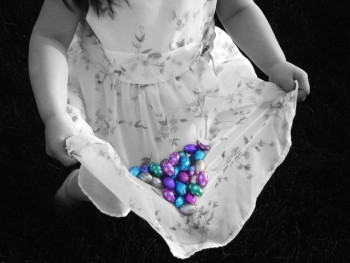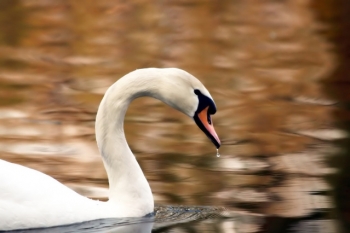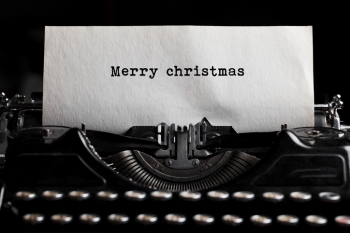
Blog (428)
My hope is to offer encouragement to writers as well as those who simply love to read. You will find eclectic snippets here—news of projects I’m working on, comments regarding books I enjoy, favorite authors, quotes, and reflections regarding my own experiences. I especially like to write about my dreams—those parables in the night seasons. Symbols and metaphors delight and intrigue me. You will find them here.
I don't do joy well. I'm more proficient at expecting the worst. I began to pray, "God how do I do joy better? Show me what that means." He was quick to answer. Bill Johnson, pastor of Bethel Church in Redding, California says, "God does not hide things from us; he hides things for us." Johnson states that this concept is like God hiding Easter eggs. He hides them according to our age and maturity. In other words, a two-year-old will need eggs to be in plain sight, as opposed to an eight-year-old who may derive more delight and challenge in finding Easter eggs hidden deep in folds of grass. Regarding the theory of joy, I'm more like the two-year-old. Here's what I found this week. Joy manifested in the creative places God chose to hide His directives.
In the mornings before work, I have a detailed routine that helps me to prepare for the day. One of the my last tasks is applying make up. I grow easily bored with eye make up in particular, so decided to break open a new box I'd just purchased. The color palette contained four shades named: Be Grateful, Sure Thing, Brilliant and Citrus Twist. As I brushed the earth tones over my lids, I had to smile, God reminding me that his love is brilliant--a sure thing. Being grateful for my life is a good start on the road to joy, adding refreshment to my life, just like a twist of citrus adds a burst of flavor to water.
The moment we indulge our affections, the earth is metamorphosed; there is no winter and no night; all tragedies, all ennuis, vanish--all duties even. ~Ralph Waldo Emerson
I received feedback from another artist about a writing project that left me wallowing in self pity. How could the reader be confused? How could there be no positive feedback? Was the writing really that bad? I recognized my pathetic response right away. I was hungering for acceptance, but instead was told the project needed to be abandoned. Start over. And I'd paid money to get this feedback.
For several weeks I laid on my self-pity mat, flat on my back and gulped in fear and doubt. Paralyzed. I'd responded this way to negative feedback in the past. Yet this blow felt more painful. The reader was someone I highly respect and admire. I thought perhaps I was somehow in his "league"--that I might write almost as well as he did. Yet after the feedback, I sensed I was in a much lower caste than I'd realized. I concluded it would probably be best to abandon the book project as he suggested. Start over, devise a detailed outline of every chapter. Yet even in my disparagement regarding the project, some of the negative response did not ring entirely true for me. Certainly, I was not paying the reader to praise every word of the material, but to come to a conclusion of dismembering the book seemed overly harsh. I continued to wail, moan and cry. "How could I be so misunderstood?"
...that world far off as a little picture hung on the wall...Carrie Brown (from The Stargazer's Sister)
We could hear the banter of people laughing and talking as we pushed open the door of the Italian eatery--that rush of indistinguishable words, at times accentuated with high pitches, then descending into quiet murmuring. The place was candlelit. An aroma of rosemary and basil drifted from the kitchen. We sat at the bar, and I held my elbows close to my side so that I wouldn't touch the woman sitting next to me. Out of the corner of my eye I saw her pale flesh through tiny squares of fishnet hosiery, smelled the iconic scent of Chanel No.5 when she tossed her hair from her shoulder to take a sip of wine. My husband and I sat, heads together, speaking loudly over the roar, clutching tightly to our flutes of Prosecco, feeling people bumping our backs now and then, the line of individuals waiting to be seated curling outside the door. Through the restaurant's front window I could see people outdoors lighting up cigarettes, lifting their faces to breathe out smoke, standing arm-in-arm, stamping their feet to keep warm in the chilly black night. Finally we heard,"Garatti" above the din. I swung my feet around the bar stool, grabbed my husband's hand and followed him to our table for two.
The clatter of plates and the sound of people never diminished as we sat eating our food. My throat ached from yelling. I fell silent, and my gaze drifted to a little painting hung on the wall above our table. In the soft light I couldn't see the image clearly. I stood and moved my eyes only inches from the painting. I saw a rose-colored house with an orange tile roof sittng on a a verdant, Tuscan hillside. The image seemed to speak louder than the cacophony around us in its simplicity. I shouted, "Look Giovanni, this is our house in Italy. One day we'll be there." My husband smiled and said, "One day." Sharing that image together seemed to quell any need for speaking. We finished up our meal with no words, savoring the food, not fighting the indisdinct, undulating swell of speech around us.
Giovanni gave me a manual Olivetti typewriter for Christmas. I'd seen an ad on Craig's list for a manual typewriter and said one day, "You know, I loved my old typewriter. I wrote all my term papers on a manual in college. I never even wanted an electric one. I liked the feel of my fingers pressing down on the keys, the gentle 'ding' at the end of a line of type, the contrast of black words on white paper." My husband is good at picking up on my desires. And he knows me. That's one reason he married me--I'm convinced--my eccentricities. Who else would want a manual typewriter?
This week as Christmas has neared I've waxed nostalgic in other ways. Giovanni and I don't have cable TV. We get a variety of stations that primarily broadcast reruns of old shows. One day this week a whole day was set aside for Andy Williams Christmas specials on one of the channels. I watched several episodes, remembering how excited my parents and I would get to sit down together and watch the programming, color television still new, grateful for good reception and no rabbit ears. Andy singing I'll Be Home For Christmas as fake snow swirled around him. The Osmond brothers dancing and harmonizing, adorable Donny not yet a star.
The Lightness Of Anchors, Leave Me Here
Written by Priscilla K. GarattiHe'd pulled up a chair at my office desk to view the computer screen. The man was at my agency to make sure I was doing my job--there to inspect spreadsheets and documentation--to ensure all my ducks were in a row. I had dressed for the part--a black business suit, the jacket cuffs rolled up to display leopard print accents. I wore Bandolino leather pumps. I had prepared for the site visit, my emotional notes tranquil and relaxed, my mind alert, sharpened. I had braced myself for the inspector's feedback as well--anticipating he would say there was much to improve. My numbers were down on persons I'd tested for HIV and Hepatitis C, and I'd not been able to complete as many education groups as I'd projected for the year. I sensed the inspector would gently exhort me to keep increasing numbers, leaving me with that wearying thought, "You'll never do enough." But after the examiner's perusal of my work, his response astonished me.




